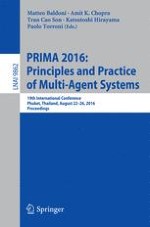2016 | OriginalPaper | Buchkapitel
Argumentation for Practical Reasoning: An Axiomatic Approach
verfasst von : Phan Minh Dung
Erschienen in: PRIMA 2016: Principles and Practice of Multi-Agent Systems
Aktivieren Sie unsere intelligente Suche, um passende Fachinhalte oder Patente zu finden.
Wählen Sie Textabschnitte aus um mit Künstlicher Intelligenz passenden Patente zu finden. powered by
Markieren Sie Textabschnitte, um KI-gestützt weitere passende Inhalte zu finden. powered by
